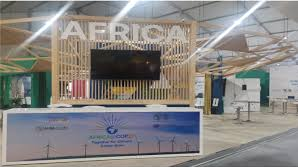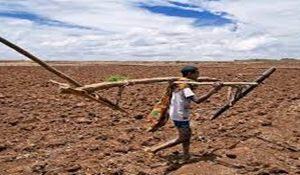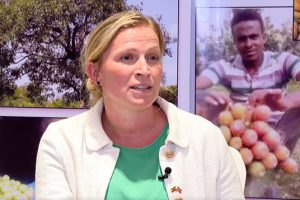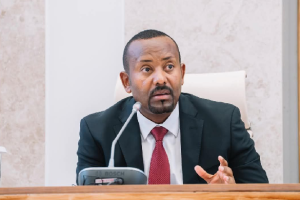
Africa’s industrial sector is in its infancy level and its contribution to global emission is insignificant. Yet, Africa is a major victim of global warming and climate change. Its impact obviously felt by the poor countries in which their economy derived from rain fed agriculture which is the feature of Africa.
The advanced countries developed their economy based on uneconomically exploiting of the natural resources and by utilizing carbon based energy as input for their economic growth since the advent of industrial revolution in 1850.
Their industries and machinery had utilized petroleum and petroleum products such as benzene, naphtha and coal in which their emission gas is critically pollute the environment.
It is undeniable fact that, industrialization began in Western Europe dramatically changed human life from the traditional to the modern one, advanced science and technology which again made human life easy and enhanced production and productivity but posing global warming is its demerit.
In developing countries, when agriculture faces shortage of rainfall, crop failure has been common as the result, poor farmers might be forced to leave their places for search of food and ultimately left to be dependent on foreign handouts to survive.
According to the UN report, a third of the African population depends on foreign aid to meet its daily bread. Similar to the sedentary farm the live stoke sector also is affected by drought. The pastoral community living in the low land parts which move from place to place for searching grazing land and water during the drought season, critically suffer from shortage of resources which support their lively hood.
When things go to the worst their animals will meet their death in the wilderness. In our country particularly in the last two years due to drought almost millions of animals were lost.
Contrary to these, flood due to over rain posed by climate change destroys agricultural lands, dams utilized for small and medium size irrigation farm, It also damages residential houses located in the suburb of rivers in urban centers and dismantled electric power plants and other infrastructure.
Global warming brought multi- dimensional effect on Africa. Water points have been dried up and underground and surface waters are dwindled. Marine life is also threatened.
When the river water flows to dams reduced the electric power generation capacity of dams also reduced which again put countries in energy crises and put pressure on industries to produce bellow their average capacity.
It is proved that when the agriculture sector is critically affected by extreme weather condition in Africa not only farmers and agriculture but also the whole economy will be affected.
Africa has abundant natural resources but due to the absence of technology, finance and well-qualified trained manpower, unable to exploit it as the result poverty is rampant. Global warming also hampered the countries efforts to reduce poverty.
According to FAO, currently Africa imports 40 percent of its food from abroad. Hence to reverse the situation to the better, the leaders must stand together to be herd in the international plat form particularly on mitigating global warming.
Considering the alarming situation of climate change for the first time in 1972 scientists all over the world gathered in Stockholm, Sweden held talks and before the matter put the planet endangered, countries particularly the industrialized one, the major emitters agreed to reduce their carbon dioxide released to the atmosphere from their industries.
Later the climate change issues were floored in the United Nations plat forms and multilateral organizations which deal the matter were established. Since then using the UN plat form and other mechanisms have been introduced to facilitate climate negotiations but still global warming is alarmingly continued.
Factors which hampered countries not to reach to agreement are among others that they are divided between developed and developing with divergent interests.
The developed countries in the last 150 years embarked on the development path by utilizing carbon based energy sources and have been releasing emission gas which has hazardous effect on the environment. The developing countries still did not develop strong economy and their contribution for global warming is negligible.
The developing countries forwarded their plea to the UN general assembly that the advanced countries to reduce the amount of their emission and to change their energy sources from carbon based to the renewable one such as solar, wind, geothermal and others.
The advanced countries fundamentally agreed with what developing countries propose but they claim that changing the carbon based energy to none carbon needs time and closing industries which used coal may bring lying off workers which intern might pose social unrest. In addition, implementing the reached agreement at the UN plat form needs the endorsement of the legislatives organ of the governments in their respective countries.
In fact, global warming has a global effect manifested in terms of economy, social and political impacts and the legislatives in advanced countries prioritize their domestic matters than the global and this again creates hurdle in implementing the agreement reached in the multi- lateral platforms.
The other parties of the climate negotiations such as China and India agreed that global warming is a threat to the world. Yet they claim that they are still developing countries. Concerning their contribution for global emission though, it is higher or similar to the United States and Western Europe, their per capita emission is similar to the developing countries as they are the most populous countries in the world. Therefore, they request the negotiating parties to reconsider these.
The developing countries on their part claim that unlike the advanced countries, they did not pursue the development path by compromising the environment in the past. Nevertheless, they are the victims of global warming posed by human activities and pledged to pursue environment friendly development path by exploring and exploiting their reach renewable energy sources and to that end, they need to get technical and financial support from advanced countries.
In addition, they request developed countries to provide money in the form of compensation because they have historical responsibility by aggravating global warming which affected the developing countries economic growth.
But there are still factors which aggravate pollution on the part of poor countries. More or less, the Paris Climate Negotiation took place in 2015 by COP 26 brought some consensus among the negotiating parties and planned to attain carbon free development by 2050 through reducing emission gas to zero level. And to that end, agreed each party to do its home work in line with the agreement. Hence African leaders must exert their effort until the voice of the continent to be herd properly in the international climate forum and to get equal dividend from negotiation.
Due to underdevelopment, in these countries, the majority of the population use bio mass energy for the house-hold purpose. Moreover, the clearance of vegetation cover and cutting plants for energy and constructing houses aggravates soil erosion and land degradation. The burning of wood and using kerosene for cooking poses in house pollution, which brings health risks on respirational system.
According to the World Health Organization 60 percent of child mortality in the rural part of Africa is induced by in house pollution. To mitigate climate change and global warming developing countries embarked on the path of green growth development. Afforestation and reforestation program can be mentioned here.
Tree plantation helps sequestrating carbon from the environment, protecting soil erosion which poses land degradation. When agricultural land is degraded soil fertility is reduced which again reduce crop production.
Afforestation also helps to percolate rain water to underground which intern replenish water. When water points, ponds and lakes get sufficient water marine lives will be preserved. Rivers water volume also increased and the amount of water used for irrigation and flow to the dams increased which intern increases their power generation capacity.
The introduction of electric power based rail transport and the banning of the importation of carbon based vehicles in our country supports the objectives of developing Climate Resilient Green Economy. Reducing of the importation of petro chemicals energy sources saves currency that would have been allocated for importation.
Hence showing commitment to the internationally agreed principles and doing our own homework in mitigating climate change should be a priority agenda.
BY ABEBE WOLDEGIORGIS
THE ETHIOPIAN HERALD WEDNESDAY 19 MARCH 2025





